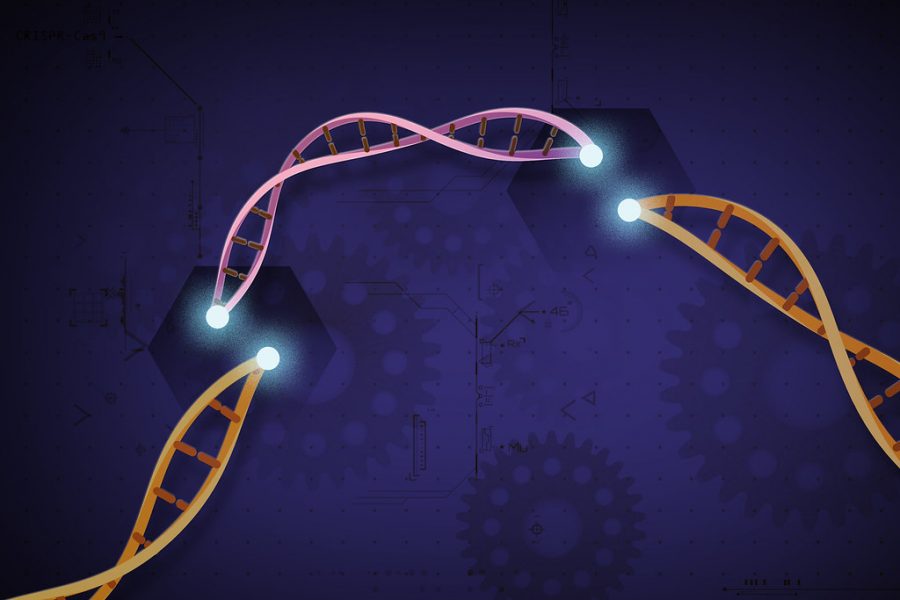OPINION: Support gene researchers
Just because you’ve watched Jurassic Park doesn’t mean you know that gene editing is bad
Gene editing is an important area for further research.
April 17, 2020
Gene editing is the future and we should embrace it. I don’t mean a wholehearted approval of the technique but to recognize that it’s here. We must be thoughtful about its applications and aware of its potential.
We’ve been gene editing all throughout history. Selectively breeding animals and crops to promote the traits that are desirable or helpful to us. But today’s gene editing is much different.
“We use CRISPR-Cas9, which can target specific gene sequences to edit,” said Samantha Noll, a bioethicist with the Functional Genomics Initiative.
CRISPR, a gene editing tool taken from bacterial defenses against viruses, allows molecular biologists here at WSU to alter specific genes in big animals. Compared to CRISPR, selective breeding is crude and inaccurate, only using phenotypic traits, such as eye or hair color, as the roadmap for which animal to breed or not. Selective breeding attempts to manipulate the genome by prioritizing expressed traits whereas CRISPR allows the manipulation of the genome by access to the entire gene pool.
Charlie Powell, the public information officer for WSU’s school of Veterinary Medicine, mentioned multiple ways this gene editing technique can be applied positively.
“At any given moment here in the US there are a million pigs in transit. A certain percentage of those animals will develop upper respiratory diseases as a result of the stress,” Powell said. “If we could make those pigs resistant instead of vaccinating them then we have the possibility of limiting those losses in the industry. This involves adding back the wild-type genes that they originated with.”
This suggests ethical solutions by way of medical intervention. Lingering just on livestock application, how much animal suffering could be eliminated by well-applied selective gene editing? Instead of injecting tons of antibiotics, genetic immunity may be the way to go.
Fostering the path to healthier and happier livestock could be inroads to alleviating human challenges such as hunger and poverty. Abundance of sustainable and ethically produced meats could ease food demand, and resilient healthy livestock could be a valuable investment for underprivileged individuals.
Being a land-grant university, WSU research is primarily aimed at helping the local community, hence the focus on big animals and local agriculture. One of the research programs seeks to knock out the genes responsible for horns in cattle. This avoids the painful horn removal process for the animals and prevents accidental injury between cattle, which cost time and money.
Though these are promising initiatives, we can’t be short-sighted either. William Kabasenche, a bioethicist focusing on the therapeutic applications of CRISPR, described what he called “off-target” effects.
“It’s called pleiotropy, when one gene influences multiple phenotypes,” Kabasenche said.
Phenotypes are just the expressed traits. The information for those traits is stored in the gene. Off-target effects occur when a gene has unaccounted phenotypes, meaning that the manipulation of that gene produced an unforeseen or undesirable change in a phenotype.
This is why we have to be very careful when gene editing. Yes, the potential is huge both for scientific discovery as well as the well-being of conscious entities but we must guard against a utopic vision of the technology. There are trade-offs involved. Changing one gene may produce the desired effects, but drastically impact an unrelated but necessary function.
This stresses the need for research and the role of ethics in research. We should all want this work to be done, but we cannot simply focus on positive outcomes and draw the conclusion that it justifies its good. We must also consider how these outcomes are achieved.
We must also consider the harmful potential of gene editing. How we choose to engage our resources, the decisions and norms we set in research will in some part determine how we’ll apply this technology. These norms are being born at research institutions like WSU.
It’s a promising start that WSU includes ethicists, educators and biologists to tackle these difficult issues.

















